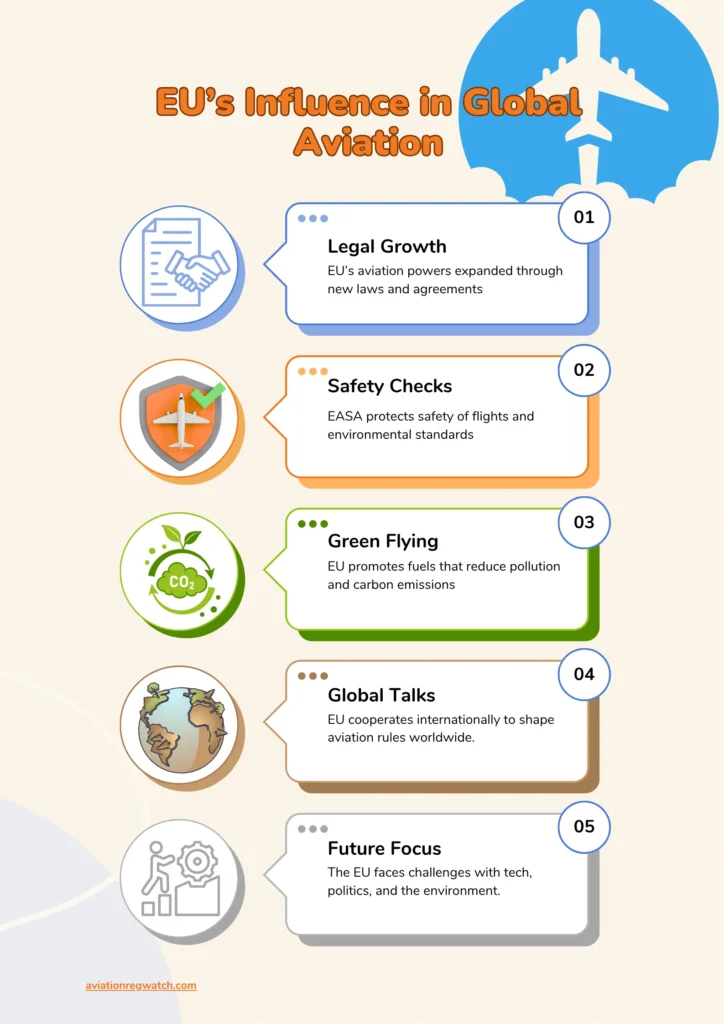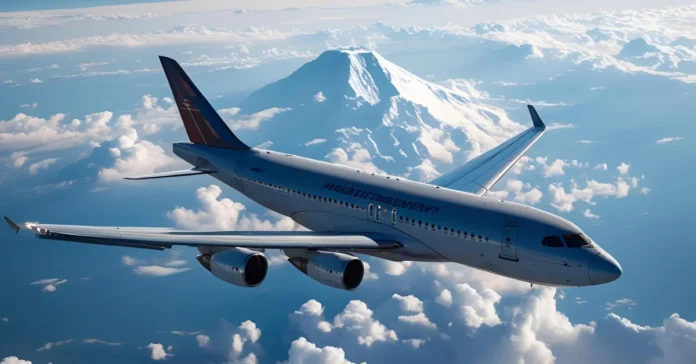Discover how EU aviation governance drives global standards, sustainability, and collaboration to shape the future of aviation worldwide.
The European Union has become a significant player in global aviation over the years. It started as a group focused on the internal market. Now, it plays a vital role in international aviation.
This blog will examine the EU’s role, its influence on others, and its implications for aviation’s future.
The EU’s Unique Position
The EU is different from countries in aviation administration because it’s not a country itself. It does not have the same level of authority as the countries that are members of the International Civil Aviation Organization (ICAO).
However, it has found methods to be heard and respected. It has enhanced its legal powers, technical knowledge, and collaborative efforts to influence international aviation regulations.
The EU utilizes law, knowledge, and storytelling to amplify its voice, enhancing global aviation through improved safety, sustainability, and collaboration amid ongoing challenges.
Key Strategies and Actions
Expanding Legal Competencies
The EU has grown its power in aviation law. It started with a big win in 2002 when the European Court of Justice (ECJ) ruled that the European Commission (the EU’s executive body) had the sole authority to negotiate international aviation agreements, centralizing this power at the EU level.
Prior to that, individual EU countries had entered into bilateral air service agreements with non-EU countries, resulting in fragmented and inconsistent regulations. The EU further expanded its legal authority through agencies like EASA, ensuring safety and environmental standards
The European Union has numerous agreements and regulations that address various areas, including safety and environmental protection
Building Technical Expertise
The EU has become highly skilled in aviation regulations, leveraging its experience from the internal market. The European Commission and the European Union Aviation Safety Agency (EASA) play a key role.
EASA checks safety and the environment. It makes sure everyone follows EU rules.
Regulatory Influence
The EU establishes regulations that affect more than just its own territory, creating challenges for other countries trying to access its market. This approach enhances the EU’s influence.
Additionally, the EU collaborates with other countries and organizations, further strengthening its position in the aviation sector

External Recognition
The EU works well with other groups. It’s more important than the European Civil Aviation Conference (ECAC) in Europe. It also works closely with EUROCONTROL.
It has a significantbig role in air traffic management. The EU also supports global efforts, collaborating with ICAO and other organizations.
How the EU Works in Aviation
- Legal Power: Since 2002, the EU gained more control over aviation laws.
- Expert Agencies: Organizations like EASA ensure that planes and airports comply with safety and environmental regulations
- Strong Rules: The EU makes rules that many countries follow, helping keep flying safe and clean.
- Global Partnerships: The EU works with groups like ICAO to improve flying worldwide.
Impact and Implications
The EU’s hard work and clear goals have paid off. It has more influence than it should, thanks to the European Commission. This is good for aviation worldwide:
- Setting Standards: The EU’s strict rules are a model for others. This helps make aviation safer and greener.
- Promoting Sustainability: The EU pushes for cleaner flying. It supports sustainable aviation fuels (SAF). SAF could help a lot in reducing emissions.
- Facilitating Cooperation: The EU works well with others. This helps everyone work together better in aviation.
- Addressing Challenges: The EU tackles safety issues head-on. This helps make flying safer for everyone.
Challenges and Future Directions

The EU has made great strides in aviation. Yet, it faces many challenges to solidify its global role:
- Maintaining Consensus: It’s hard to balance the interests of all member states. Getting everyone to agree on policies takes time.
- Navigating Legal Constraints: The EU must deal with legal hurdles and political pushback. This makes expanding its aviation role tough.
- Adapting to Change: The EU needs to stay flexible. It must keep up with new tech, security threats, and the push for green aviation.
Conclusion
The EU’s journey in aviation shows its vision, skills, and determination. It has become a major player in setting global aviation standards. It promotes green flying and works with others.
As the aviation world changes, the EU’s role will grow. It will help make flying safer, more efficient, and eco-friendly for everyone.
EU Aviation Governance: FAQs
- What makes the EU’s role unique in global aviation governance?
The EU is not a sovereign country but a supranational entity. Unlike individual countries, it leverages legal frameworks, technical expertise, and diplomatic influence to shape international aviation standards and practices. - How has the EU expanded its legal competencies in aviation?
Since a landmark legal victory in 2002, the EU has progressively expanded its authority in aviation law, covering areas like safety oversight, environmental protection, and market regulations. - What is the role of EASA in the EU’s aviation governance?
The European Union Aviation Safety Agency (EASA) is crucial—it ensures compliance with safety and environmental rules within the EU and extends the EU’s regulatory influence globally through its standards. - How does the EU promote sustainability within the aviation sector?
The EU actively promotes sustainable aviation by supporting sustainable aviation fuels (SAF) and implementing stringent environmental regulations aimed at reducing aviation emissions. - What main challenges does the EU face in strengthening its global aviation influence?
The EU must manage internal consensus among member states, overcome legal and political challenges, and adapt to rapid technological changes and increased security concerns to maintain and grow its global role.

